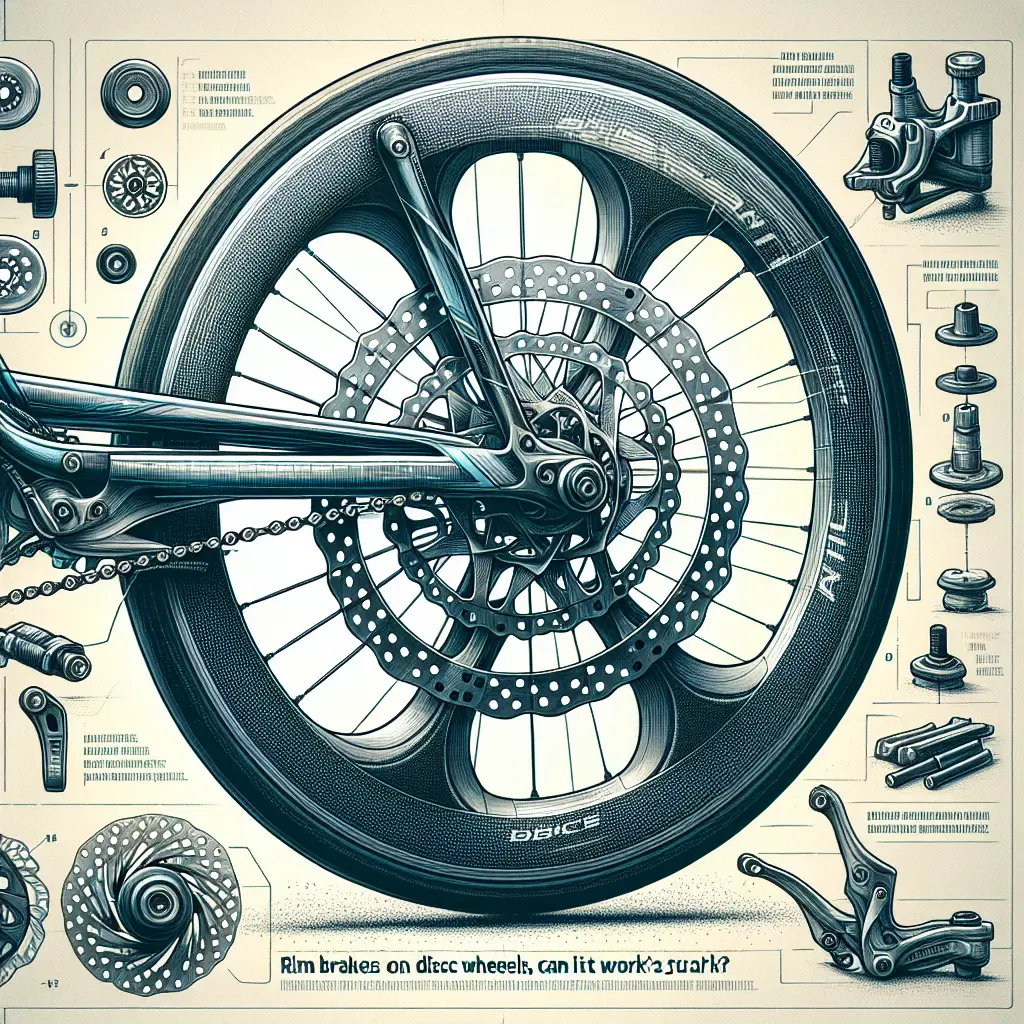Can I Use Rim Brakes on Disc Wheels? Unraveling the Compatibility Conundrum
The cycling world has undoubtedly been revolutionized by technological advancements, with one of the most heated debates centered around braking systems: rim brakes versus disc brakes. If you’re thinking about upgrading your wheelset or are just plain curious, you might be asking, “Can I use rim brakes on disc wheels?” This is a nuanced question that requires a deep dive into the compatibility and safety aspects of these components. So, buckle up and let’s roll through the answers together.
Understanding the Basics: Rim Brakes vs. Disc Brakes
Before we unravel the compatibility conundrum, it’s important to understand the fundamental difference between rim brakes and disc brakes. Rim brakes, as their name implies, use a braking surface on the rim of the wheel. When you engage the brake lever, the brake pads squeeze against the rim to slow down the bike. Examples of rim brakes include caliper, cantilever, and V-brake designs.
Disc brakes, on the other hand, utilize a separate disc (rotor) attached to the wheel hub around which calipers grip to create friction and stop the wheel. These are commonly found on modern mountain bikes, road bikes, and some hybrids.
Can You Use Rim Brakes on Disc Wheels?
The short answer is: not directly. Disc wheels are designed with the assumption that the braking forces will be applied to the rotor, not to the rim. This means disc-specific wheels may lack a braking surface that is crucial for the functionality of rim brakes.
However, the long answer comes with a caveat. Some wheel manufacturers design ‘hybrid’ wheels that have both a rim brake surface and the mounts for a disc rotor. Such wheels can be used with either braking system, provided the correct type of rotor or brake pad is used for the intended purpose. Notwithstanding, these are far from common and typically not recommended because of the potential confusion and safety risks they might pose.
Technical Compatibility: Material and Construction
Disc wheel rims might not have the anodized or machined surface found on rims designed for rim brakes. This surface is critical for the proper function and safety of rim brakes; without it, braking can be loud, uneven, and the reduced friction can substantially increase stopping distances, especially in wet conditions. Moreover, the walls of disc-specific rims might be too thin to handle the stress applied by rim brakes, which can lead to rim failure and, consequently, an accident.
In discussing wheel makeup, it’s pertinent to understand that the materials used in modern bicycles are the result of precise engineering decisions. The switch from [rim to disc brakes] (https://www.cyclingweekly.com/news/product-news/rim-brakes-will-die-out-says-brake-manufacturer-trp-325356) introduces a paradigm shift in wheel design, focusing on different stress distribution areas and heat dissipation requirements.
Assessing Rim Brake Mounts on Frames and Forks
Another aspect to consider is the frame and fork of your bicycle. The majority of bikes designed for rim brakes lack the necessary mounts for disc brakes. Conversely, disc brake bikes have specific mounts for the caliper that would not align with rim brake components. Upgrading a rim brake bike to accommodate disc brakes often necessitates also replacing the fork and possibly the frame—a costly endeavor, which can be found detailed in the expertise on Sheldon Brown’s knowledge base.
Finding the Right Solution for Your Bike
So, if you’ve got a set of disc wheels and a rim brake bike, what do you do? If you’re set on using the disc wheels, your best course of action is to find a rim brake-compatible version of the wheel, or alternatively, if financially viable, upgrade your entire braking system to disc brakes, including the necessary changes to your bike’s frame and fork.
Should you decide to switch to disc brakes, not only will you need new wheels but you’ll also experience the advantages of disc brakes, as thoroughly explained by the experts at BikeRadar. These include improved braking performance in wet and muddy conditions and a broader selection of tire options since disc brakes remove the width constraints imposed by rim brake calipers.
Safety and Performance Should Always Come First
While the question of using rim brakes on disc wheels can be addressed from various angles, one constant remains: safety. Brakes are one of the most critical safety components on a bicycle, and any modification involving braking systems should prioritize reliable performance and security above all else.
When considering any upgrades or changes to your bike, always consult a professional bicycle mechanic. No amount of saved expense can justify compromising on safety or the integrity of your ride. Remember, cycling is as much about the journey as it is about the destination, and ensuring your bike is set up correctly allows you to enjoy both with peace of mind.
Wrapping Up: Sticking to What’s Tried and True
In the end, the common recommendation for cyclists is to use the components that are specifically designed for their setup. Rim brakes and disc brakes have distinct differences that extend beyond simple stopping power. These systems have engineering and design philosophies backing them that influence not just how they operate, but how they integrate with other parts of your bicycle.
To conclude, while technically, you may find ways to fit rim brakes on disc wheels with creative engineering, the blend of safety concerns and the necessity for proper mechanical function makes it advisable to stick to the appropriate components for your braking system. For a detailed explanation of best practices and additional advice on cycling safety and wheel compatibility, be sure to also check the comprehensive guides at CyclingTips.
Stay safe and keep the rubber side down!

